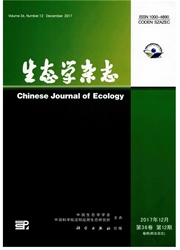

 中文摘要:
中文摘要:
湿地植物间关系主要包括竞争(负效应)和促进(正效应),是湿地生态研究的核心内容之一,对植物分布、群落和生态系统组成具有重要的调节作用。本文阐述了竞争理论及影响湿地植物竞争能力的主要因素,介绍了促进作用及其在湿地生态系统中的形成机理,详细综述了植物间关系转变的主要理论以及影响湿地植物间关系转变的主要环境因子(水位、温度、盐度、生物因子)。随着环境胁迫强度的增加,植物间关系一般会从竞争转变为促进作用,即优越条件下以竞争为主,胁迫条件下以促进作用为主。针对当前湿地植物间关系的研究多集中于滨海盐生湿地,类型较单一的情况,认为将来需加强对淡水湿地、河口湿地等各类系统的研究。同时,加强湿地植物间关系转变的生物学机制、时间效应,对新研究方法的探索等方面的研究也有助于进一步理解湿地植物间竞争和促进作用的发生及转变机理。
 英文摘要:
英文摘要:
Interactions among wetland plants mainly include competition (negative effect) and facilitation (positive effect) , which are the primary content of wetland ecology. Plant-plant interactions also play an important role in determining plant distribution and in regulating the composition of community or ecosystem. This paper describes the theories of competition and the main factors affecting competition ability of wetland plants, introduces the concept of facilitation and its formation mechanism in wetland ecosystems, and discusses the theory about the shift of plant-plant interaction and the main environmental factors (water level, temperature, salinity, biotic factors) influencing the shift of plant-plant interaction. With the increase of stress intensity, plant-plant interaction generally shifts from competition to facilitation, that is, competition usually occurs in favorable environments while facilitation dominates under stress conditions. Currently, many studies have been performed in coastal salt marsh ecosystems and the studied ecosystem type is incomprehensive, therefore, research efforts should be expanded to other wetland ecosystems, such as freshwater and estuary wetlands. Meanwhile, studies on biological mechanisms and time-dependent effects on the shift of plant-plant interaction, the exploration of new methodology should be strengthened in the future, which will be helpful to understand the mechanisms on the formation and shift of competition and facilitation among wetland plants.
 同期刊论文项目
同期刊论文项目
 同项目期刊论文
同项目期刊论文
 plant distribution can ben reflected by the different growth and morphological response to water lev
plant distribution can ben reflected by the different growth and morphological response to water lev 期刊信息
期刊信息
